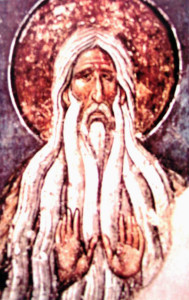EIGHTH DAY of CHRISTMAS:
St. Macarius’s Day
Today we celebrate St. Macarius of Alexandria, known for his extreme asceticism (a word dangerously close to aestheticism, no?). But before he became so hardened against the things of this world, Macarius was a confectioner, and so he is known as a patron saint of cooks, confectioners and pastry chefs. This, as you might guess, is the St. Macarius we are most interested in on this Eighth Day of Christmas. Some people have a hard time saying St. Macarius, and so he has also been known over the ages as St. Macaroon––fitting enough for a confectioner, I’d say.
Macarius was born in Alexandria in the early fourth century and it is in that fabled city where he made his living selling candies and pastries. In about 335, he left the bustle of the city to become a monk, and eventually made his way to a monastery in the desert (a word dangerously close to dessert, no?) and lived the life of a hermit from there on out. He ate very little: raw vegetables most days, and on special days, a bit of bread dipped in oil.
There is a rather nice story attributed to St. Macarius, a story he is said to have told his fellow monks in the monastery, who were interested in perhaps moving out of the desert and into the city in an attempt to reach more souls. Macarius spoke of a barber in a small town who eked out a decent living by charging three coins for a shave. He earned enough this way to sustain himself and his family and to even save a little extra for his old age. But he heard a rumor that barbers in the nearby city were charging a lot more than three coins for the same service. He thought long and hard about this, and finally, he made the decision to sell all he had in the small town and move to the city and set up shop there, where he could earn a larger profit for his services. And so he did.
Sure enough, at the end of his first day in the city, he had earned more than he had ever earned in the small town, and the barber was quite elated. And after closing up shop, he headed for the market to buy food and provisions for his family, but he found that everything in the big city market was much more expensive than it had been in the small town. Indeed, he ended up with no money at all in his pocket that day––a trend that continued each day after. Finally, the barber decided it would be best to return to his native town, where at least he made a small amount of progress each day in his savings.
With this story, St. Macarius swayed his fellow monks to stay in the quiet solitude of the desert. And of course there is a lesson in this story for all of us: a lesson of quiet patience, the understanding that sometimes what is best for us is right where we are.
St. Macarius became so devoted to his asceticism that he began to take things to some extreme ends. He once spent twenty days out in the open air without sleep, a self-inflicted punishment for accidentally killing a mosquito that had bit him. I’ve always been wary of extremists, and so for me, the best celebration of St. Macarius’s Day for this Eighth Day of Christmas is a celebration that calls to mind his place as a patron saint of confectioners and cooks. It’s a great day, I think, for enjoying something sweet. Think of all the joy that confectioners bring us. Certainly Macarius brought much joy to the people of Alexandria when he was selling candies and confections there. And so on this Eighth Day of Christmas, remember St. Macarius, and take joy (and maybe have a macaroon or a macaron.)
Image: St. Macarius of Egypt, from an old Ukranian codex. He seems to be saying, with his hands extended in front of him, “No thanks, no dessert for me.” [Public domain] via Wikimedia Commons.
